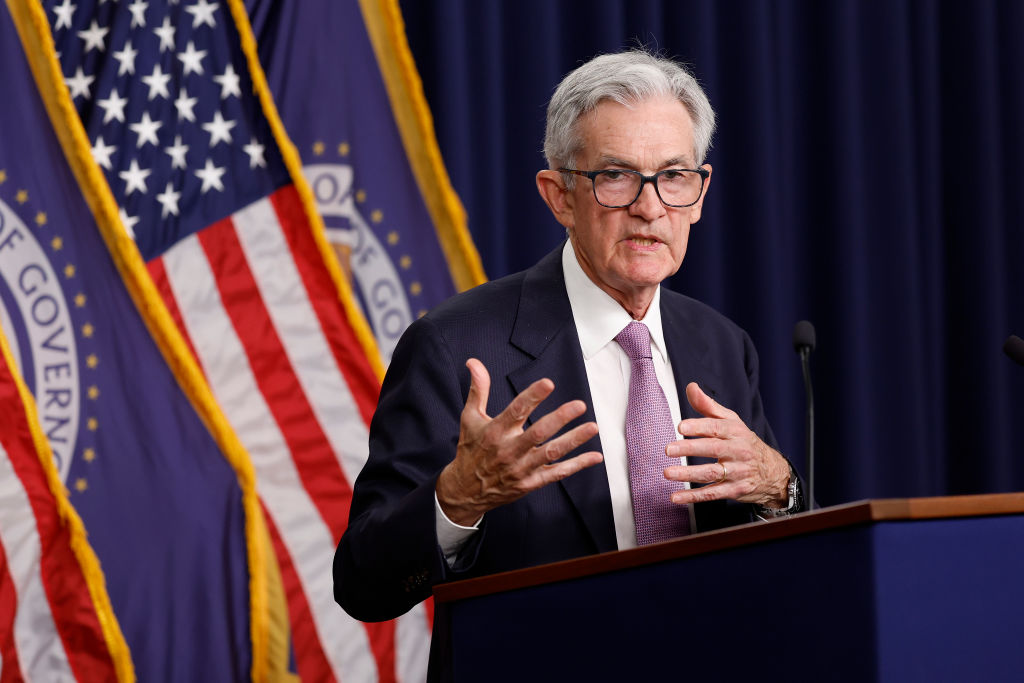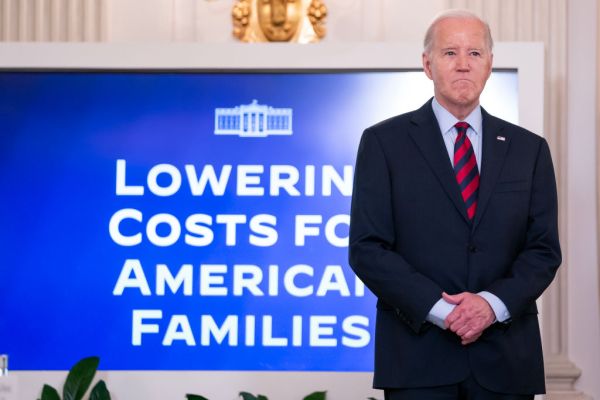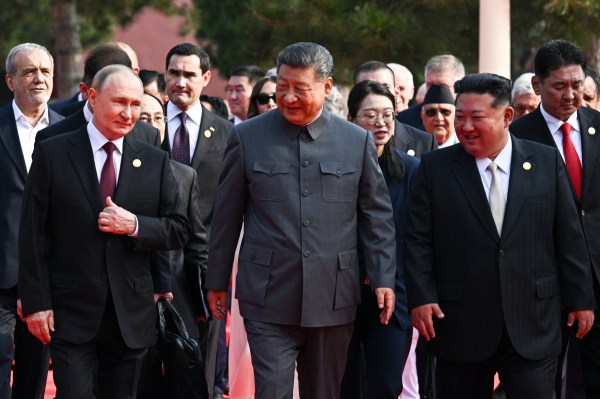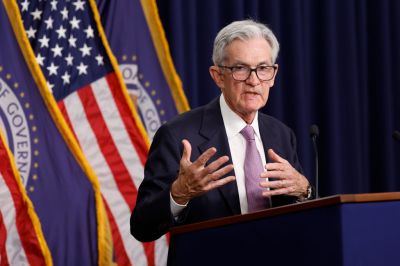Happy Thursday! To exist on the internet these days is to be inundated with images of the dewy-looking, toothless, baby pygmy hippo named Moo Deng. She’s out on the town with Pete Davidson (always a red flag), going on Hot Ones, and being favorably compared to Kevin Durant.
But we’ll know her time as an internet phenomenon has come to an end when Moo Deng—which loosely translates to “bouncy pig”—shows up on the social media account of a member of Congress: Such is the lifecycle of a meme.
Quick Hits: Today’s Top Stories
- The central bank’s Federal Open Market Committee lowered the federal funds rate on Wednesday by 50 basis points to a target range situated between 4.75 and 5 percent, marking the first rate cut since 2020. Federal Reserve officials hiked rates 11 separate times between March 2022 and July 2023 to battle inflation, which has since eased from its year-over-year high of more than 9 percent in June 2022. This cut came in the wake of successive jobs reports that seem to indicate a weakening U.S. labor market; maintaining low unemployment is the other half of the Fed’s dual mandate, in addition to keeping inflation in check.* In a press conference following the central bank’s decision, Fed Chair Jerome Powell said he hoped the rate cut would improve “price stability without fostering higher rates of unemployment.”
- Ukrainian military drones struck and blew up a large Russian ammunition arsenal—that included ballistic missiles—early Wednesday morning in the Russian Tver oblast town of Toropets, nearly 250 miles west of Moscow. One Ukrainian official told the Washington Post that the Russian warehouse was “literally wiped off the face of the Earth.” Although there were no reported casualties, explosions from the attack’s blast were detected by NASA satellite heat sensors, and earthquake monitors nearby recorded the explosion as a 2.8 magnitude earthquake. Russia’s regional governor for Tver claimed that its defenses destroyed all of the Ukrainian drones—some 54, according to Russian-state media, though a Ukrainian official claimed that more than 100 drones were used in the strike. Meanwhile, a new Wall Street Journal report suggested that more than one million people have been killed or wounded in Russia’s war in Ukraine since February 2022.
- Lebanese officials reported Wednesday that more than a dozen people were killed and some 450 others were injured after more communication devices used by Hezbollah—the Iranian-backed terrorist group—apparently exploded in Lebanon, just one day after thousands of the group’s pagers detonated at once. The devices targeted in Wednesday’s detonation were radio communication devices, mostly walkie-talkies, though Lebanese state media claimed that several solar energy systems in the Lebanese capital of Beirut also exploded. The Israeli government has not commented on the mass explosions, though Mossad—the Israeli intelligence agency—is reportedly behind the attacks.
- Meanwhile, Israeli Prime Minister Benjamin Netanyahu said Wednesday in brief and cryptic remarks posted to social media that Israel “will return the residents of the north securely to their home,” referring to the tens of thousands of Israeli civilians who have been displaced from their communities for nearly a year amid ongoing Hezbollah attacks. The same day, Israeli Defense Minister Yoav Gallant announced more troops were being sent to the border with Lebanon as the “center of gravity” of the war with Hamas and other Iran-backed proxies shifts northward.
- The Biden administration issued new sanctions on Wednesday against 12 people accused of committing human rights abuses in connection to the Iranian regime, approximately two years after the death of Mahsa Amini in Iranian police custody sparked mass protests and brutal government crackdowns. Those sanctioned include members of the Iranian Revolutionary Guards Corps, Iranian prison officials, and others located outside of Iran who were “responsible for lethal operations overseas,” according to the State Department. Some of the Iranian operatives sanctioned are accused of killing prisoners who demanded better living conditions, torturing and sexually assaulting prisoners, denying medical treatment to political prisoners, and kidnapping Iranian dissidents outside of Iranian territory.
- U.S. intelligence officials said Wednesday that Iranian hackers sent illegally obtained documents from former President Donald Trump’s presidential campaign to people associated with President Joe Biden’s campaign earlier this summer, but that the recipients in the Biden campaign did not reply. According to officials with the Office of the Director of National Intelligence, the FBI, and the Cybersecurity and Infrastructure Security Agency, Iranian hackers have continued their efforts to send the stolen material—lifted from the email accounts of longtime Trump adviser Roger Stone—to U.S. media organizations. In a statement earlier this summer, Director of National Intelligence Avril Haines warned that Iran was trying aggressively to stoke discord ahead of the November elections.
- The House of Representatives on Wednesday failed to pass a continuing resolution (CR)—put forward by House Speaker Mike Johnson—to extend government funding for six months that included a measure that would require showing proof of citizenship to vote. The funding vehicle failed by a vote of 202-220, with 14 Republicans voting against the bill, two voting present, and three Democrats—Reps. Jared Golden of Maine, Marie Gluesenkamp Perez of Washington, and Don Davis of North Carolina—crossing the aisle to vote in favor of the measure. The GOP members who voted against the measure were a mix of defense hawks concerned that six months was too long to extend military funding at current levels and those who typically vote against CRs because they’re opposed to current government funding levels. The federal government will shut down if Congress does not pass either the 12 funding bills required to fully fund the government or a stopgap bill to extend funding before September 30. The Senate will likely now try to negotiate their own version of a CR.
- The Justice Department filed a lawsuit on Wednesday against two Singaporean companies that owned and operated the container ship, the Dali, that crashed into and destroyed Baltimore’s Francis Scott Key Bridge in March after a power outage on the ship. The federal government is seeking $100 million in damages, alleging that the two companies were negligent in maintaining the vessel, which the suit calls “abjectly unseaworthy.” According to the DOJ, the ship’s owners knew the vessel was at risk of power outages and that four systems intended to provide steering in the event of an electrical failure did not function properly. “This was an entirely avoidable catastrophe, resulting from a series of eminently foreseeable errors made by the owner and operator of the DALI,” Principal Deputy Assistant Attorney General Brian M. Boynton said in a statement.
Mission Accomplished?

Wednesday was a win for devotees of the Purple Tie Theory. Addressing reporters in a regal-looking tie that close Federal Reserve watchers swear is an indicator of Fed Chair Jerome Powell’s mood, Powell announced that the Federal Open Market Committee (FOMC) had decided to cut the federal funds rate by an aggressive .50 percentage points, from the 5.25 to 5.5 percent range to 4.75-5.0.
The move is a sign that the Fed believes that the U.S. economy has mostly emerged from a period of high inflation and that it now must focus on the other part of its “dual mandate”: ensuring low unemployment.
Wednesday’s was an atypical meeting for the members of the FOMC. The unusually large cut—the first half-point in four years—was not unanimously decided, as is typically the case. Governor Michelle Bowman, who favored a less aggressive 0.25-point rate cut, dissented—the first time a governor has voted against the Fed’s ultimate decision since 2005.
Still, the central bankers seemed generally bullish on achieving their dual mandate. “The committee has gained greater confidence that inflation is moving sustainably toward 2 percent,” the central bankers said, “and judges that the risks to achieving its employment and inflation goals are roughly in balance,” meaning that the risk of overshooting the Fed’s official target of 2 percent inflation is now less of a concern.
If you’ve read our previous coverage of the Fed, you know that TMD has closely followed the “landing” discourse: Will the economy suffer a “hard landing,” where efforts to curtail inflation contribute to a recession, or a “soft landing,” where recession is avoided and inflation falls without hurting employment? Stretching the metaphor to its limits, Fed watchers have more recently raised the possibility of “no landing,” which would see the Fed’s efforts at macroeconomic manipulation come to naught with both inflation and the economy continuing to grow at roughly their current rates.
It seems like the Fed now believes that it has achieved the fabled soft landing. The Fed’s projections of falling inflation, declining unemployment, and stable growth were “just about the closest thing to a ‘Mission Accomplished’ banner you can imagine them unfurling,” Jason Furman—an economist at Harvard’s Kennedy School of Government and chairman of former President Barack Obama’s Council of Economic Advisors—tweeted Wednesday afternoon.
Powell was more circumspect. “We’re not saying mission accomplished or anything like that,” Powell said on Wednesday. “But I have to say, though, we’re encouraged by the progress that we have made.”
“We will get down to two percent inflation, I believe,” he added.
Many indicators point in that direction. Certainly, the economy continues to grow: Through the first two quarters of this year, U.S. gross domestic product (GDP) has grown at an average annual rate of 2.2 percent, down only slightly from a 2.5 percent growth rate over the whole of 2023.
But inflation, while down significantly from the last few years, is still not fully under control. The Bureau of Labor Statistics’ latest Consumer Price Index (CPI) report, which uses a basket of consumer goods and services to measure inflation, saw inflation rise 0.2 percent in August and 2.5 percent over the last 12 months. “Core” inflation, which excludes more volatile food and energy to reveal the stickiest price increases, came in at a 3.2 percent annual rate.
The Fed prefers another measure, the Personal Consumption Expenditures (PCE), but its last reading in July was similar: 2.5 percent topline inflation, with 2.6 percent core inflation. The Fed’s target rate is always pegged to core PCE, which, like CPI, excludes food and energy from the index.
Even though Americans are still dealing with high prices for basic goods—$100 of groceries in January of 2020 would cost $122 today, according to the BLS’s inflation calculator—the outlook for consumers has improved. For the last 12 months, wage growth has narrowly outpaced inflation, by 1.5 percent over the last year.
But it’s possible that “last mile” in controlling inflation may be the hardest to achieve. “There’s an open question as to whether the last mile of disinflation will be harder,” Furman told TMD. “Is it harder to get from two-and-a-half to two, than it was to get from five-and-a-half to two-and-a-half? I tend to think it is, but we just don’t have enough historical experience to know for sure.”
Even if inflation has seemed in the last several months to be headed in the right direction after the Fed began to raise rates in March 2022, recent job market statistics gave central bankers reason to focus their attention on the other half of their mandate. “It seems unlikely that the labor market will be a source of elevated inflationary pressures anytime soon,” Powell said in an August speech in Jackson Hole, Wyoming. “We do not seek or welcome further cooling in labor market conditions.”
But cooling labor market conditions—typically associated with interest rates that cause consumers, and therefore employers, to tighten their belts—were exactly what the central bankers seemed to have. The August jobs report released this month showed unemployment at 4.2 percent—down slightly from July’s 4.3 percent but still higher than the 50-year low of 3.4 percent in 2022. Job growth has also slowed, as 142,000 new positions were added in August—lower than expected—along with downward revisions in the estimates for June and July. The revised estimates spooked economists, who were concerned that they signaled even more weakening in the labor market than had been assumed.
For the Fed, that seemed to mean go-time. “I believe our patience over the past 18 months has served us well,” Christopher Waller, a member of the Federal Reserve Board of Governors, said in early September. “But the current batch of data no longer requires patience, it requires action.” If that wasn’t clear enough, the speech was titled: “The Time Has Come.”
The concern now is likely a hiring slowdown prompted by sustained high interest rates: When money is expensive, consumers spend less, and employers slow their hiring, which can eventually send the economy into a recessionary spiral. Brendan Walsh, a principal at Markets Policy Partners, told TMD that spirals can sneak up on economies. “When you stop hiring all of a sudden, if things kind of slow down, then you start firing,” he said. “But that happens really, really quickly: It kind of gradually slows down, and then you kind of fall off of a cliff.”
Some Republicans were quick to cry foul about a rate cut so close to the election. Speaker of the House Mike Johnson, a Republican from Louisiana, told reporters that “the timing is a little suspect.” Former President Donald Trump has also previously insinuated that the Fed cutting interest rates this month would be motivated by a desire to boost Vice President Kamala Harris’ chances of winning the presidency by goosing the economy. “It’s something that they know they shouldn’t be doing,” Trump told Bloomberg Businessweek in July of the central bankers’ rate cut.
Trump also falsely claimed in August that President Joe Biden and Harris had attempted to cover up the revised jobs numbers. “They wanted it to come out after the election, but somehow it got leaked,” he asserted.
Powell was asked about criticism of his committee on Wednesday. “We’re not serving any politician, any political figure, any cause, any issue, nothing,” he said in response to a question from CNN. “It’s just maximum employment and price stability on behalf of all Americans.”
Trump—who had once mused about removing Powell during his first administration—has said he would not reappoint Powell as chair but would “let him” fulfill his term, which ends in 2026.
Trump has previously suggested that the president should have influence over Federal Reserve policy decisions, telling reporters in August that, “I feel the president should have at least [a] say in there.”
Earlier this year, The Wall Street Journal reported that former Trump administration officials had drafted a plan to give the president more power over the Fed. The proposal envisions subjecting Fed regulations to White House review, requiring it to consult with the president on interest-rate decisions, and arguing that Trump has the authority, if elected, to eject Powell as chair—an open question. Trump’s campaign staffers at the time downplayed the plan’s legitimacy.
For her part, Harris told reporters in August that “the Fed is an independent entity, and as president, I would never interfere in the decisions that the Fed makes.”
But the institutional culture of Fed officials also makes serious presidential interference unlikely. Waller—one of two Trump appointees on the Board of Governors and considered a contender for chair if Trump is reelected—told reporters after his Notre Dame speech that he had no interest in presidential input. The president is “free to do so just like everybody else,” he said. “That doesn’t mean I have to listen or adjust policy to that, but he is entitled to every damn opinion he wants.”
And the central bankers will likely have lots of opinions to tune out ahead of November’s election. But Powell, of the Purple Tie, seems bullish. “The U.S. economy is in a good place,” he said Wednesday, “and our decision today is designed to keep it there.”
Worth Your Time
- In the Wall Street Journal, Rainer Zitelmann reflected on Friedrich von Hayek’s Road to Serfdom on the book’s 80th anniversary. “In the 1940s, state interventionism was on the rise in Europe and the U.S.,” he wrote. “As today, the prevailing belief was in aggressive government intervention in the economy, high taxes and strict regulations. There was a misconception among intellectuals that National Socialism was a form of capitalism. In 1939, the philosopher Max Horkheimer, co-founder of the Frankfurt School, said: ‘But whoever is not willing to talk about capitalism should also keep quiet about fascism.’” Road to Serfdom, Zitelmann noted, served to counter that narrative. “Hayek later explained that his book was primarily addressed to those among the British socialist intelligentsia who saw Nazism as a reaction to classical socialist trends. In reality, it was a necessary outcome of those tendencies.”
- Can political exiles save Russia from Russian President Vladimir Putin? Not likely, Michael Kimmage and Maria Lipman argued in Foreign Affairs. “The country’s political future will be written not in Berlin or London or New York but in Russia itself,” they wrote. “It will be written by those who live out the war there, whether or not they support it. To leave is to lose the opportunity to participate in the process and to abandon the country in wartime, inviting shame and stigma, especially for those who settle in the West. To leave is also to join the exiled opposition, an unstructured network far removed from the levers of power in Moscow. … Instead of fantasizing about political revolution, the West should recognize the richness of that diaspora, which lies in its many forms of ability and expertise, from the academic to the journalistic to the artistic. It is in the West’s self-interest to grant political asylum to Russians fleeing Putin’s despotism and to direct funding in a manner that promotes their cultural and intellectual contributions.”
Presented Without Comment
Wall Street Journal: How the Trump Campaign Ran With Rumors About Pet-Eating Migrants—After Being Told They Weren’t True
A Vance spokesperson on Tuesday provided The Wall Street Journal with a police report in which a resident had claimed her pet might have been taken by Haitian neighbors. But when a reporter went to Anna Kilgore’s house Tuesday evening, she said her cat Miss Sassy, which went missing in late August, had actually returned a few days later—found safe in her own basement.
Kilgore, wearing a Trump shirt and hat, said she apologized to her Haitian neighbors with the help of her daughter and a mobile-phone translation app.
Also Presented Without Comment
The Hill: [Pennsylvania Gov. Josh] Shapiro Forgets ID, Denied Alcohol While Trying To Celebrate Canned Cocktails Law
Also Also Presented Without Comment
New York Post: Rutgers President Jonathan Holloway To Resign From $1M-a-Year Job Over Toxic Campus Environment
“I haven’t talked about this until now. … I don’t want to be in an environment where I need, where my family needs, protection. That’s the part I didn’t bargain for.”
In the Zeitgeist
Two days before the 50th anniversary of Billie Jean King’s victory in her famous “Battle of the Sexes” tennis matchup against Bobby Riggs, Congress voted to award the tennis icon the Congressional Gold Medal—making King the first female athlete recipient to receive the prestigious national honor, once President Joe Biden signs his approval.
King’s 1973 victory in the first “Battle of the Sexes” matches still ranks as the most-watched tennis event in television history.
Toeing the Company Line
- In the newsletters: The Dispatch Politics team covered a Tim Walz rally in purple North Carolina, Jonah panned (🔒) faux outrage about media bias, and Nick took stock (🔒) of the incoherence of the nominally populist Republican ticket.
- On the podcasts: Jonah is joined on The Remnant by Tom Standage, historian and deputy editor of The Economist, to discuss how humans react to innovation, and on Advisory Opinions, Sarah and David reflect on their controversial trip to Princeton.
- On the site: James Bloodworth writes about the recent convulsions of the European right—and why they might have more to do with declining working classes than animus toward immigrants.
Let Us Know
It’s hard for all of us here at Dispatch HQ to believe, but we are just weeks away from celebrating our fifth birthday as a company. As we reflect on the past several years, we’d love to hear from the people who have made it all possible: our members.
Whether you’ve been with us from the day the Pirate Skiff first launched or just signed up last week, we’d love to hear from you. What are some of your favorite Dispatch memories from over the years? What motivated you to sign up in the first place? What has your membership meant to you?
Send us an email at fiveyear@thedispatch.com—it could be a written note or a brief video. Some of our favorite responses will be featured in a special project we’re working on …
Correction, September 19, 2024: Fixed a typo related to the Federal Reserve’s dual mandate.









Please note that we at The Dispatch hold ourselves, our work, and our commenters to a higher standard than other places on the internet. We welcome comments that foster genuine debate or discussion—including comments critical of us or our work—but responses that include ad hominem attacks on fellow Dispatch members or are intended to stoke fear and anger may be moderated.
With your membership, you only have the ability to comment on The Morning Dispatch articles. Consider upgrading to join the conversation everywhere.